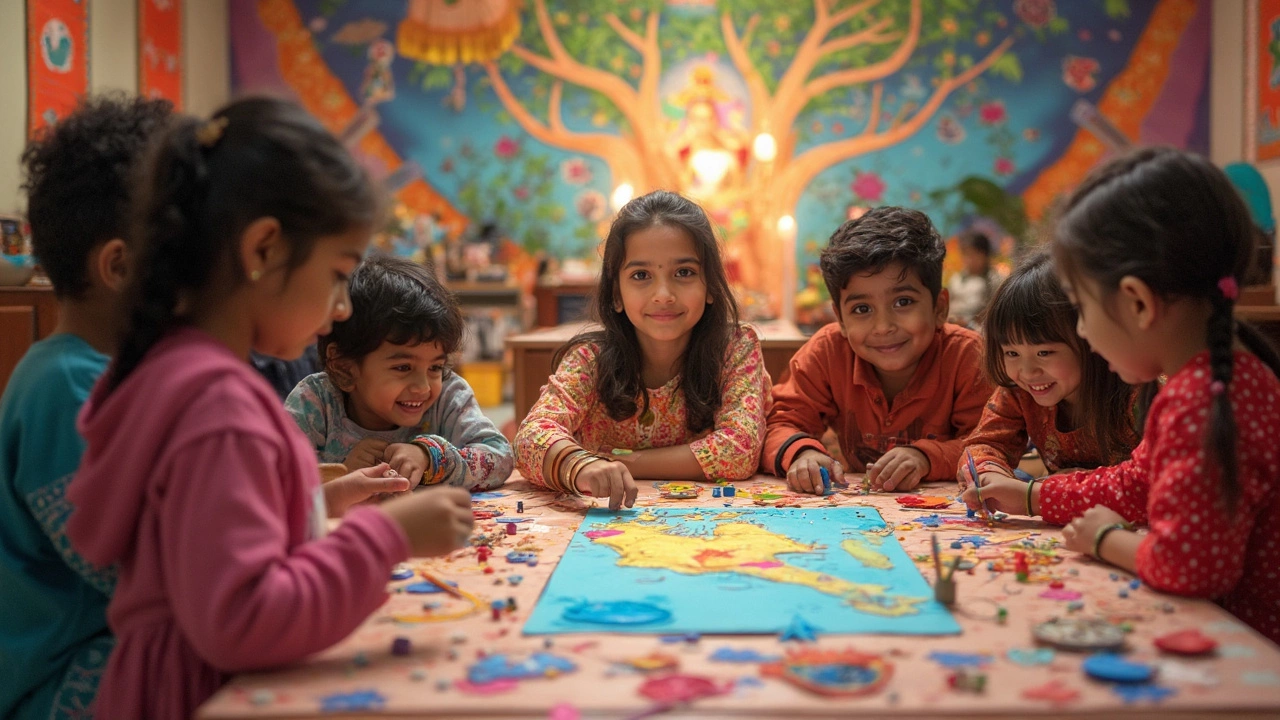Ever noticed how kids light up when they're having fun? That's the magic you want in your after-school club. The trick lies in tapping into their interests and keeping things fresh and surprising.
Start by learning what the kids are into. Is it superheroes or science? Knowing this helps you plan activities they genuinely enjoy. A simple survey or casual chat with the kids can give you tons of clues.
Next, turn up the fun with interactive games and activities. Kids love moving around and trying new things, so mix physical games with brain-teasers. Maybe a scavenger hunt one day and a treasure map challenge the next?
- Understanding Kids' Interests
- Interactive Games and Activities
- Themed Days and Weeks
- Creative Arts and Crafts
- Guest Visitors and Workshops
- Feedback and Flexibility
Understanding Kids' Interests
Anyone with kids knows they're like little idea factories—always buzzing with enthusiasm for something new. To make your kids club truly exciting, start by zeroing in on what grabs their attention.
First step? Get curious! Chat with the kids about their favorite hobbies, TV shows, or books. A quick informal survey can do wonders. Sometimes, just listening to their playtime chatter can spark ideas.
Why Knowing Interests Matters
When you align activities with their interests, kids show up excited, participate more, and the club just naturally becomes more fun. It's like adding extra fuel to their engine of curiosity.
Did you know? Studies suggest kids are more engaged and retain information better when they're interested in the subject. So don't miss out on tapping into those superhero stories or dinosaur facts if that's what they're into.
Adapting Activities to Interests
Wondering how to weave interests into your club routine? Try theme days. If they're obsessed with space, plan a day to build cardboard rockets. Love for music? How about an air guitar contest or a DIY music station with pots and pans?
To make things even more structured, include interest-based short projects. Here's a straightforward approach:
- Brainstorm and list potential theme ideas based on known interests.
- Plan a calendar with different themes for each month or week.
- Gather resources and craft plans for activities that fit these themes.
The more you involve them in deciding activities, the more they own the fun. So keep the feedback loop going—ask them what they loved, what they'd tweak, and watch your after-school club thrive.
Interactive Games and Activities
Kids are all about fun, right? One way to make your kids club lively is by organizing interactive games and activities that get them moving and thinking. Plus, these activities can teach them new skills without the usual classroom vibe.
Organized Group Games
Group games like 'Capture the Flag' or 'Red Rover' can be super thrilling. They build teamwork and strategic thinking among the kids. If space is an issue, consider indoor alternatives like 'Simon Says' or a musical chairs competition. The key is to have games where everyone can participate and feel involved.
Puzzle Challenges
Puzzles and brain teasers are a great hit, too. Think escape room challenges built right into your club space. You can set up stations with different tasks and watch them solve puzzles collectively. It's a fun way to boost their problem-solving skills.
DIY Game Creation
How about letting the kids create their own games? Give them materials like cardboard, colored papers, and markers, and let their imaginations run wild. You'll be surprised at the fantastic games they can whip up, and it gives them a sense of ownership and creativity.
Quick Fun with Minute to Win It
The 'Minute to Win It' challenges can be a refreshing addition. These are quick, funny tasks like stacking cups, blowing up balloons using only their lungs, or balancing items. They’re simple to set up but offer loads of laughter and excitement.
Activity Rotation
To keep things interesting, rotate activities regularly so kids don’t get bored with the same old thing. Every week can feature a new set of games, which keeps them coming back eager to see what’s new.
Interactive games aren't just 'playtime'; they're great for teaching kids how to work together and think outside the box while having a blast. And hey, that’s a win-win, right?
Popular Activities Study (Optional)
| Game | Popularity | Educational Value |
|---|---|---|
| Capture the Flag | High | Team Strategy |
| Puzzle Stations | Moderate | Problem Solving |
| Minute to Win It | High | Coordination |
Themed Days and Weeks
Kids get excited about surprises and special themes. Incorporating themed days and weeks in your after-school club can make each visit unique and something to look forward to. Every theme should make kids curious and encourage participation.
Themed days could revolve around popular topics like Superhero Day, where kids dress up and participate in superhero-themed activities. Alternatively, try Crazy Hair Day, where kids can showcase their wildest hairstyles.
Planning a Themed Week
Why not extend the fun with a full week dedicated to a theme? A Science Week, for instance, might include experiments, visits from local researchers, and a science fair. In one survey, clubs that hosted a Science Week reported a 30% increase in child engagement due to their hands-on activities.
"Themed events are a great way to bring learning to life and create vital engagement opportunities within our children," says Lina Mateo, a renowned child psychologist.
When planning your themed events, always balance structure with flexibility. If you sense the kids are losing interest, it's okay to tweak the plan. Inclusivity is key, so ensure themes reflect the diverse interests and cultures of your group.
Here's a quick outline of how to plan a themed week:
- Pick a Theme: Choose something broad to allow flexibility and accessibility for all.
- Schedule Activities: List the main activities for each day. Think of crafts, games, or mini-projects.
- Invite a Guest: Consider inviting a guest speaker or expert associated with the theme.
- Wrap-Up Event: Conclude with a showcase or party related to the theme.
Incorporating themed days and weeks not only boosts engagement but also fosters a sense of community and shared excitement among kids. The key is creativity and flexibility, ensuring there's something for every child's interest.

Creative Arts and Crafts
Arts and crafts are all about letting kids unleash their inner Picasso while having a blast. What makes it even better is mixing art with themes that tie into their interests. This way, they're not just crafting, they're experiencing a whole new world through their creativity.
Start with the basics. Stock up on colorful supplies—think markers, colored paper, glitter, and glue. Kids love having a rainbow of options to choose from. Turn these into a 'create your own superhero' workshop. Kids can design capes, masks, and even make their own superhero emblems. It'll be like Halloween all year round!
Seasonal Crafts
Nothing gets kids more excited than seasonal crafts. Think about organizing sessions around holidays or seasons. For spring, how about a garden gnome or birdhouse project? Not only are they crafting, but they're also learning a bit about nature and the environment.
Storytelling through Art
Encourage kids to create characters, then tell stories using their crafts. For example, puppet-making can turn into an exhilarating puppet show. Not only does this stretch their imagination, but it's a wonderful way for shy kids to express themselves.
According to a survey conducted in 2023, clubs that incorporated creative arts and crafts saw a 20% increase in ongoing participation. It seems kids just can’t get enough of colorful messes that turn into masterpieces!
Adding a Twist
Why not include a surprise guest visit from a local artist? It would not only inspire kids but give them a new role model in the arts scene. With every little piece of art they create, they're gaining confidence and developing problem-solving skills.
By weaving in crafts into your club, you're making playtime educational and endlessly fun. Plus, moms and dads love hanging those crafts up at home!
Guest Visitors and Workshops
Bringing in guest visitors can transform a regular day into something special for the kids. Imagine the excitement when a local firefighter pops in to talk about safety, or an artist demonstrates their painting techniques. These interactions offer children a firsthand glimpse into different careers and hobbies.
Workshops are another hit. Kids love getting their hands on new projects. You might invite a chef to teach simple cooking techniques or a scientist to conduct fun experiments. What's fantastic here is that workshops are hands-on, making learning more memorable.
Plan Ahead
Planning is key. Contact local professionals or hobbyists who might be willing to volunteer their time. It's amazing what a simple email or phone call can do. Check their availability well in advance to avoid last-minute hiccups.
Engagement Tips
Keep things interactive. Encourage kids to ask questions, and let them try things themselves under supervision. If a visitor brings props or tools, it can make the whole experience richer for the after-school club.
Balancing Variety and Routine
If you're concerned about finding new visitors every week, don't stress. A monthly guest can be just as effective. Balance routine with these special events, so kids have something exciting to look forward to regularly.
By including guest visitors and workshops in your kids club, you're not just adding fun but also enhancing their exposure to real-world experiences. It's a win-win for everyone involved!
Feedback and Flexibility
Running a kids club isn’t just set and forget. Kids' interests can shift faster than the latest dance trend, and that’s where feedback and flexibility come in. Regular feedback from both the kids and their parents can be a game-changer in making the club as fun as it can be.
Why Feedback Matters
Kiddos have minds of their own, and what works one week might fall flat the next. Get feedback by asking questions or using simple rating systems. Parents can help identify what's clicking and what needs a revamp. Listening keeps your activities relevant and exciting.
Being Flexible
Plans are great, but being ready to pivot is even better. Imagine the club is all set for an outdoor relay race, and then it rains. Instead of scrambling, having backup indoor activities, like interactive games, ensures the fun doesn't stop. Flexibility is about embracing spontaneity—a rainy day can become an unplanned, exciting day at the after-school club.
Here's a simple way to keep everything on track:
- Collect feedback consistently, maybe at the end of each month.
- Mix up activities based on feedback; keep the mix fresh.
- Incorporate parent-suggested themes or activities to get more involvement.
- Have a Plan B for every outdoor activity that can be adapted indoors.
Adapting to their evolving interests and preferences can help maintain — or even boost — engagement levels significantly. Building some flexibility into the schedule can keep a club lively, ensuring it stays the highlight of the day.





